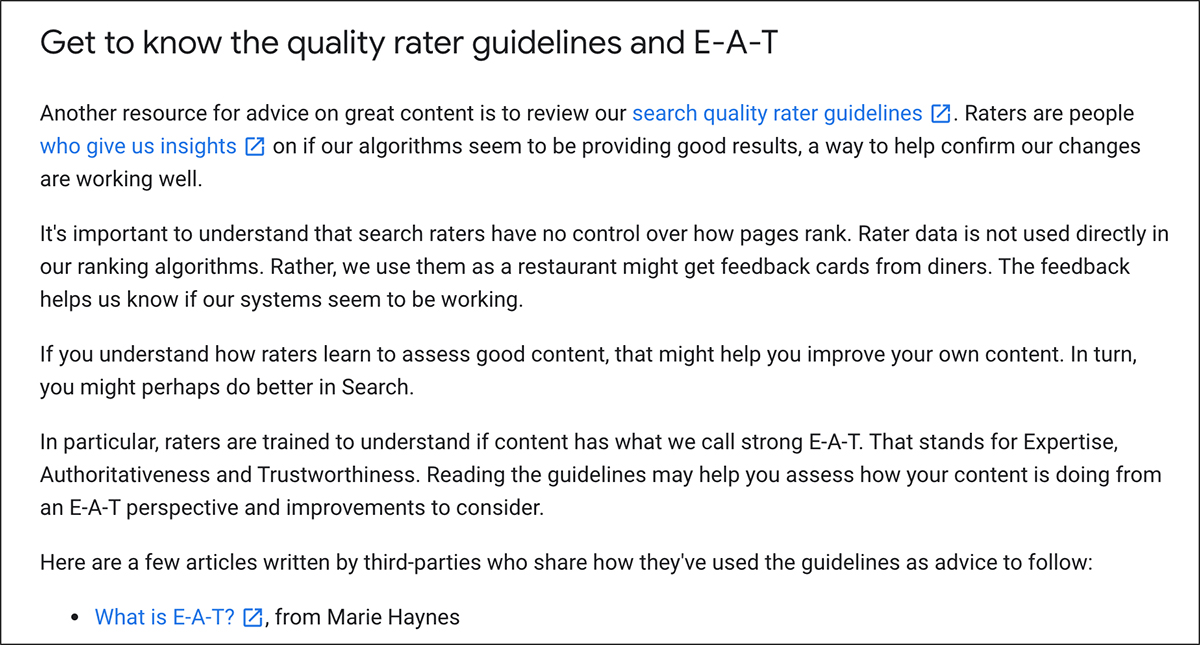Our favorite tech-giant has been busy this summer. Google typically releases one or more algorithm changes per day, historically core updates happen every few months or so. However, the last core update before this back-to-back June & July 2021 Core Update occurred back in December and before that May. Both updates, like all core updates, take approximately two weeks to roll out, are global and not specific to any language, category, or region.
Google is notoriously tight-lipped about what these core updates specifically entail. However, they do provide very specific SEO and sitemaster practices that can be found here. What we do know is that Google has been very open about their E-A-T principles and what they entail. Google wants what is best for the end-user and really, isn’t that what we all want? Over the past few years, Google has placed a lot of emphasis on quality content and good user experience.
What do we know for sure?

If your website has dropped down in SERPs recently, the first thing to do would be to eliminate what we know for a fact that Google wants. We have only to look at the other updates that we do have information on.
Google has rolled out quite a few updates in the past few months, the new 3-dot snapshot, Google’s Page Experience Update, and the Google Product Review Algorithm Update – just to name a few. There have also been quite a few spam updates released in June, as well as the predator algorithm update. However, it is important to note that core updates are about overall quality, whereas the page experience update was about performance. However, if your website has been affected recently, it may be wise to rule out any performance issues it may have – especially since the Page Experience update happened mid-June.
The Google Page Experience Update

This update covered everything from responsiveness, loading time, interactivity, to content relevancy.
These things are considered your Core Web Vitals and can be properly assessed here. We discussed this in our previous blog about Google’s Page Experience Update, but to recap – SEMs should focus on the following:
- Contentful Paint: This means your page should take 2.5 seconds or less to load.
- Input Delay: Measures how long it takes your website to load and interact – which should be less than 100ms.
- Cumulative Layout Shift: Measures the time of unexpected layout shifts on the page content – and should be less than 0.1 seconds.
- HTTPS: Your web page should be using HTTPS instead of HTTP.
- Security: Make sure your website does not have any security issues.
- Mobile Responsiveness: Your website should be mobile responsive and compatible with all mobile devices.
- Ad Techniques/Spam: Ensure the consumer has a good experience and your ad techniques aren’t disruptive or distracting.
- Stability: Make sure your website is high-performing and stable on multiple platforms.
Google’s Search Spam Algorithm Updates
 Here are some helpful tips for good security hygiene:
Here are some helpful tips for good security hygiene:
- Install a Secure Sockets Layer (SSL) certificate
- Use anti-malware software
- Create strong passwords that cannot be cracked
- Ensure all your software is kept up to date
- Do not open suspicious emails or download unknown software
- Run ongoing, regular backups
E-A-T Principles: Questions to Ask
Source: developers.google.com
Expertise, Authoritativeness and Trustworthiness. At the end of the day, if your website has those three things, you will definitely be in Google’s good graces. One only has to read the search quality raters guidelines and focus on the E-A-T sections to find out exactly what it is that Google expects. Be warned, it’s a fairly long read – so we’ll provide some highlights.
While we have covered this topic extensively in a previous blog post, here we will give you Google’s checklist of questions to ensure that your website follows the E-A-T principles.
How to Evaluate Your Content
- Does the content provide original information, reporting, research or analysis?
- Does the content provide a substantial, complete or comprehensive description of the topic?
- Does the content provide insightful analysis or interesting information that is beyond obvious?
- If the content draws on other sources, does it avoid simply copying or rewriting those sources and instead provide substantial additional value and originality?
- Does the headline and/or page title provide a descriptive, helpful summary of the content?
- Does the headline and/or page title avoid being exaggerating or shocking in nature?
- Is this the sort of page you’d want to bookmark, share with a friend, or recommend?
- Would you expect to see this content in or referenced by a printed magazine, encyclopedia or book?
Expertise Questions
- Does the content present information in a way that makes you want to trust it, such as clear sourcing, evidence of the expertise involved, background about the author or the site that publishes it, such as through links to an author page or a site’s About page?
- If you researched the site producing the content, would you come away with an impression that it is well-trusted or widely recognized as an authority on its topic?
- Is this content written by an expert or enthusiast who demonstrably knows the topic well?
- Is the content free from easily verified factual errors?
- Would you feel comfortable trusting this content for issues relating to your money or your life?
Presentation and Production Questions
- Is the content free from spelling or stylistic issues?
- Was the content produced well, or does it appear sloppy or hastily produced?
- Is the content mass-produced by or outsourced to many creators, or spread across a large network of sites, so that individual pages or sites don’t get as much attention or care?
- Does the content have an excessive number of ads that distract from or interfere with the main content?
- Does content display well for mobile devices when viewed on them?
Comparative Questions
- Does the content provide substantial value when compared to other pages in search results?
- Does the content seem to be serving the genuine interests of visitors to the site or does it seem to exist solely by someone attempting to guess what might rank well in search engines?
Parting Thoughts

Google has always maintained that there might not be anything you can do to increase your ranking, but here at Fortune Web Marketing, we believe that there is always room for improvement. Getting in Google’s good graces and staying there can be quite an arduous task for small to mid-sized business owners, but if you hire us, it’s a headache you won’t have to worry about. From a quality content plan to a winning social media strategy, Fortune Web Marketing can help your business attract the attention it deserves. Contact us today and let us help you rock the web.






